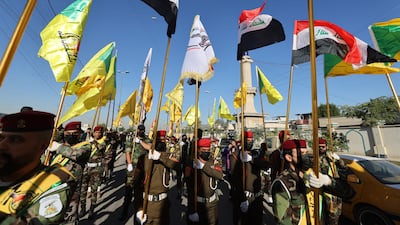Iran-backed factions in Iraq are in discussions with the government about their future roles within the security apparatus, including possible disarmament, sources told The National on Monday.
A commander of an Iran-backed armed faction said several groups have agreed to disarm and join the political process as the Iraqi government is engaging in talks with them. “The discussions are still under way, and several armed factions have agreed to disarm and join the political process,” the commander told The National.
But a source close to the Popular Mobilisation Forces (PMF) said there was an exaggeration in the portrayal of developments related to the fate of the armed factions, and said that discussions and measures have been continuing for months, even before US President Donald Trump's arrival.
An Iraqi political source said reports of armed groups withdrawing from their headquarters were inaccurate but confirmed there was pressure on the Iraqi government, and in turn, pressure from Iraqi Prime Minister Mohammed Shia Al Sudani on the groups.
According to the commander, the groups that expressed their readiness to engage in the process include Asaib Ahl Al Haq, Kataib Sayyed Al Shuhada, Kataib Imam Ali, Kataib Jund Al Imam and Ansarullah Al Awfiyaa. AAH is one of the main backers of the government of Prime Minster Mohammed Shia Al Sudani and members hold senior government positions, while Kataib Jund Al Imam is led by the Minister of Labour and Social Affairs. “Both will join forces with the Prime Minister in the coming national elections” slated for late this year, he said.
Other powerful groups such as Kataib Hezbollah, Al Nujaba Movement and Al Waad Al Sadiq Corps “reject laying down their weapons with the presence of the [US] occupation on the nation’s soil”, he added.
Explainer: Who are the main Iran-backed militias in Iraq?
These groups are affiliated with the PMF but operate outside it and do not follow the commander's orders. Acting within the “Axis of Resistance” – an Iran-backed umbrella group for militias in the region – they had sent fighters to Syria and launched attacks against US troops in Iraq and Syria.
"All factions are ready to disarm on condition that all foreign troops, whether US or Turkish, leave the country,” he said.
The PMF source said the organisation and the factions under its umbrella were ultimately under the authority of the Prime Minister and added that all previous governments, since the formation of the PMF by decision of the Shiite religious authority, have been subject to pressure to restrict arms to the state.
The continuing discussions are related to organising and restructuring state affairs, the source added. Among the changes taking place are the redistribution and deployment of forces in line with security challenges, such as the deployment of additional forces, for example, near the border with Syria following recent events there, as well as the strengthening of the presence of forces affiliated with the Ministry of Interior.
Two weeks earlier, sources told The National that IRGC commander Esmail Qaani visited Iraq to convey the message of de-escalation to proxy groups in Iraq after the Gaza ceasefire fell apart last month. “The message he carried was to confirm understanding of Iraq's position regarding the truce between Iraqi factions and the US troops in Iraq,” said an Iraqi source close to the main umbrella of militant groups at the time. “He expressed support for it and wanted to ensure it’s still in place.”
The development comes as Tehran and Washington lay the groundwork for potential landmark negotiations over Iran’s nuclear programme, its regional role and its support for non-state armed groups heavily weakened following the war with Israel.
An unannounced truce that involved Tehran and the Iraqi government in February last year halted the militias' attacks against US troops in the Middle East. However, as the war in Gaza continued, attacks resumed for a short time before the truce was restored.
Iran's regional proxy network has come under unprecedented pressure since the war in Gaza, with leaders and officials being removed in targeted Israeli attacks over the past year. But Iran-backed groups in Iraq have so far remained on the sidelines of the violence that has engulfed other groups such as Hezbollah and Hamas. Amid this backdrop, Mr Trump appears to be seeking to capitalise on what seems to be Iran’s weakened position and reopen the door to a potential comprehensive agreement that would address not only Iran’s nuclear activities but also its regional influence and support for armed groups.
One of Iran’s key remaining pressure points is Yemen, where the Houthi rebels, also known as Ansar Allah, have resumed attacks on ships in the Red Sea, drawing a renewed US bombing campaign in response.
Early in March, Mr Trump said he had sent a letter to Iranian leadership expressing a desire to reopen negotiations. Iran responded by saying that no negotiations could take place as long as the US continued its maximum-pressure campaign.
Mr Trump has insisted on direct negotiations while Iran has remained firm on its stance that it will only engage in indirect talks.
In 2015, world powers, including the US, signed a deal with Iran putting limits on its nuclear programme in exchange for sanctions relief. Mr Trump withdrew the US from the deal during his first term and instituted a “maximum pressure” economic campaign against Iran, which he reinstated when he returned to office this year.
Mohamad Ali Harisi also contributed to this report


